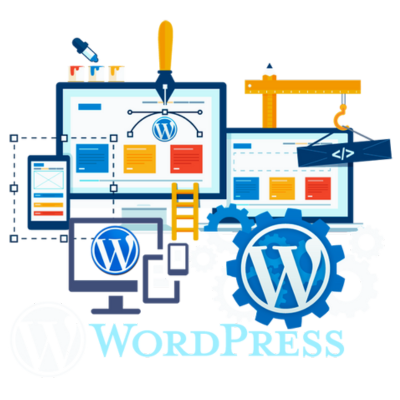Introduction
WordPress powers over 43% of all websites globally (source: W3Techs, 2024), making it the most popular platform for bloggers and businesses alike. Its flexibility, scalability, and user-friendly interface make it an ideal choice for creating and managing blog websites. In this blog, we’ll dive into why WordPress is the top choice for bloggers, breaking down its key benefits into sections with supporting stats, bullet points, and a comparative table for clarity.
Expert WordPress Development Solutions
Elevate your website with our expertise.

1. Popularity of WordPress in E-Commerce

WordPress powers a significant portion of websites globally, and its use in e-commerce is rapidly growing due to its flexibility and ease of use. Its integration with plugins like WooCommerce makes it a top contender for online stores.
Stats
- 43% of websites on the internet are powered by WordPress.
- 5+ million active installations of WooCommerce, making it the most popular WordPress e-commerce plugin.
- WooCommerce powers 22% of the top 1 million e-commerce websites.
Why Popularity Matters
- Large community support.
- Frequent updates and security enhancements.
- Easily available themes and plugins for customization.
Feature | Benefit |
Market Share | High global adoption ensures support and longevity. |
Plugin Availability | WooCommerce and others provide seamless e-commerce integration. |
Developer Community | Thousands of developers ensure continuous improvements. |
2. Ease of Use for Non-Technical Users
WordPress is known for its user-friendly interface, allowing non-technical users to manage and scale their e-commerce stores with minimal effort.
Features
- Intuitive dashboard for managing content, products, and inventory.
- Drag-and-drop page builders like Elementor simplify design customization.
- Extensive documentation and tutorials for beginners.
Benefits for Non-Technical Users
- Minimal learning curve.
- No need for extensive coding knowledge.
- Easily manage and update content.
Key Features of WordPress Dashboard
Feature | Description |
Product Management | Add, edit, and delete products easily. |
Order Management | View and process orders directly from the dashboard. |
Customization Options | Use themes and plugins for easy store setup. |
3. Cost-Effectiveness
Running an e-commerce store on WordPress is highly cost-effective compared to custom-built solutions. It offers flexibility without requiring significant upfront investment.
Cost Advantages
- Free WordPress CMS.
- Thousands of free and paid themes and plugins to suit all budgets.
- Affordable hosting options tailored for WordPress.
Cost Breakdown
Component | Estimated Cost Range |
WordPress CMS | Free |
WooCommerce Plugin | Free |
Themes | $0 – $200 (one-time fee) |
Hosting | $5 – $30/month |
Premium Plugins | $20 – $100 (per plugin, optional) |
4. Customizability
WordPress offers unparalleled customizability through themes, plugins, and custom code. This flexibility ensures that your online store aligns perfectly with your business needs.
Customization Options
- Themes: Choose from thousands of pre-designed themes tailored for e-commerce.
- Plugins: Extend functionality with plugins for SEO, payment gateways, analytics, and more.
- Custom Development: Modify themes or build custom plugins to meet unique requirements.
Top Plugins for E-Commerce Stores
Plugin Name | Purpose |
WooCommerce | Full e-commerce solution. |
Yoast SEO | SEO optimization. |
WPForms | Custom forms for inquiries. |
Stripe/PayPal Plugins | Payment gateway integration. |

5. SEO Friendliness
WordPress is inherently designed to be SEO-friendly, making it easier to rank your e-commerce store higher on search engine results pages (SERPs).
SEO Features
- Permalinks customization for clean URLs.
- SEO plugins like Yoast and Rank Math.
- Mobile-friendly themes to improve usability.
SEO Benefits
- Drive organic traffic with optimized product pages.
- Improve search rankings through schema markup and metadata management.
- Track performance using Google Analytics integrations.
SEO Features Comparison
SEO Feature | Benefit |
Permalink Settings | Clean and keyword-rich URLs. |
SEO Plugins | Automate metadata and sitemap generation. |
Mobile Optimization | Better rankings on mobile searches. |
6. Security
WordPress prioritizes security through regular updates, secure coding practices, and an array of security plugins. This ensures that your e-commerce store remains protected against cyber threats.
Security Features
- Regular core updates to address vulnerabilities.
- Plugins like Wordfence and Sucuri for advanced security measures.
- SSL integration for secure transactions.
Security Features for E-Commerce
Security Feature | Benefit |
Wordfence Plugin | Real-time monitoring and firewall. |
SSL Certificates | Encrypts customer data. |
Regular Updates | Protects against vulnerabilities. |
7. Scalability for Growing Businesses
WordPress can handle e-commerce stores of all sizes, from small businesses to enterprise-level operations. Its modular architecture allows seamless scaling as your business grows.
Scalability Features
- Optimized hosting solutions for high traffic.
- Plugins for managing inventory, shipping, and bulk orders.
- CDN integration to ensure fast loading times globally.
Scalability at a Glance
Scaling Need | WordPress Solution |
High Traffic | Optimized hosting like WP Engine. |
Global Reach | CDN integration via plugins. |
Inventory Management | Advanced WooCommerce extensions. |
Conclusion
WordPress is the ideal platform for online e-commerce stores due to its flexibility, cost-effectiveness, and robust features. Whether you’re a small business owner or managing a large-scale operation, WordPress offers the tools you need to succeed. With its vast ecosystem of plugins, themes, and a supportive community, you can create a tailored and secure e-commerce experience.



